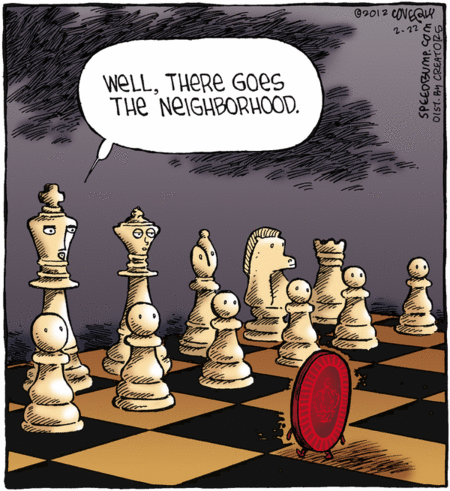When we say, “There goes…” it means that you will lose something… your chance of success is lost or at risk. Something has frustrated your plans. It can also be the end of something.
2. German Chancellor Angela Merkel said that Greece should raise its retirement age, which at the moment is somewhere between 59 and 61 years old. The Greek government now plans to raise it to 63 years old by 2015. Many Greeks are not happy about this, for obvious reasons, and I’m sure many people are shaking their heads and saying, “There goes my early retirement!” Germany raised its retirement age several years ago from 65 to 67.
3. With all of the drama surrounding the PIPA and SOPA (Stop Online Piracy Act) acts, many people are saying, “There goes the internet as we know it”. People are now becoming more careful about infringing on (violating) copyright laws… so things are definitely changing. Right now, I am able to use copyrighted comic strips on my blog for teaching purposes, without asking the copyright holder (owner) for permission. This is called “fair use”. Examples of fair use include using copyrighted material for commentary, criticism, news reporting, research and teaching. SOPA threatens the concept of fair use.








It's an interesting expression here today, I've never heard of it before. All the examples are compelling as well. The USE (= the EU) is falling apart, but they still feign that everything is more or less okay. You bet people are angry and outraged there, because they have to make up for their governments' fails. (BTW, I'm not sure "to make up" is a proper verb here).
ReplyDeleteThere goes the habitual way of life when you're moving into another country, especially when people there have very different mentality. It's important to get off on the right foot with your new acquaintances, stick to it, and figure out what to do next. :)
Hi Frank,
ReplyDeleteVery useful expression, as you likely know we have something similar here in Brazil (Lá se vai)...
When I read the news about the Oscar winners, I thought "There goes our chance to win for the best song" Anyway, Oscar is an American party to Americans celebrate Their movie industry... Let's keep up with our great way to make Brazilians movies...
Changing a bit the subject;
We have a lot of similar expressions in Portuguese...Knowing both languages, Do you think that English students can use those similarities to sounds more fluent? Or it can sound a little "embromation"?
I'm looking forward for the next post!
See you around!
Roberto
@pluton Sure... you can use "Make up" as a phrasal verb... which means "to compensate for"... so, yes, people can try to make up for their governments' failures. They have to put in extra work, make sacrifices, etc. You could also say that they have to pay for it.
ReplyDeleteI agree with you about putting aside your own way of doing things in a foreign country. As they say, "When in Rome, do as the Romans do."
Great use of expressions Eugene!
@Roberto Geronimo - Beto Hi Roberto... nice example and use of "There goes...". Great! I'm still learning Portuguese... so thanks for the translation! To answer your question... yes, I do think that students should take advantage and at least learn the expressions that have an equivalent expression in their own language. In some rare cases you will see that the translation is almost a direct one... and that's because languages haven't been as isolated as we think. We all borrow expressions, concepts and vocabulary from other languages. So... of course, we should capitalize on those that are similar... but at the same time, press on to learn more.
ReplyDeleteTHERE GOES OUR NEIGHBAROOD can correspond in Brazil a LÁ SE FOI NOSSO SOSSEGO or ACABOU-SE
ReplyDeleteNOSSA TRANQUILIDADE. Other examples:
THERE GOES MY HAT = MEU CHAPÉU JÁ ERA.
THERE GOES THE CONCORDIA = LÁ SE VAI O CONC
(said her captain)
THERE GOES, sometimes, = FOI PRO BREJO,
or FODEU-SE.
@Anonymous Thanks for expanding on the Portuguese meaning... "ACABOU-SE" makes sense, because one possibility for "There goes..." is that something has "ended" or is "finished".
ReplyDelete"JÁ ERA" is also logical (easy to remember). It's literally like saying "It was/ it used to be" or "It is no longer".
There goes my opportunity to getting a job.
ReplyDeleteThis is such a great resource that you are providing and you give it away for free. I love seeing blog that understand the value. I am glad to have found this post as its such an interesting one! I am always on the lookout for quality posts and articles so i suppose i am lucky to have found this! I hope you will be adding more in the future…
ReplyDelete